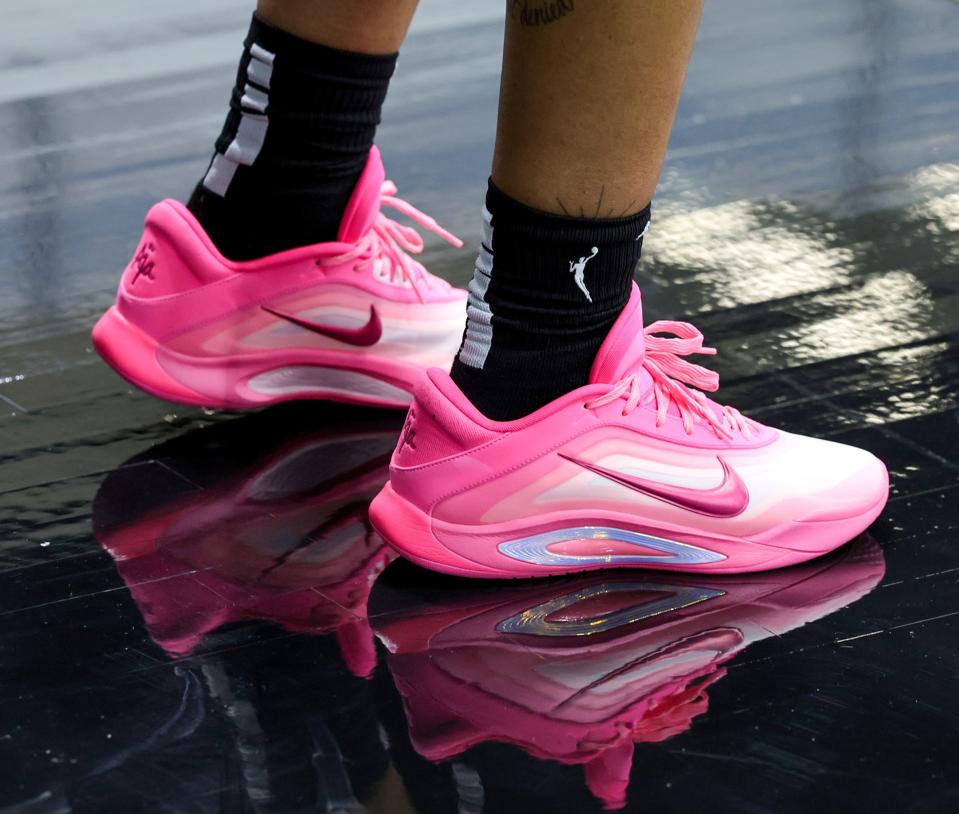“A’ja Wilson’s on top, top, top! Can’t take her spot, spot, spot!”
Two Black girls playing a hand game, beads and barrettes bopping as they remix the playground classic, “Miss Mary Mack,” is not the opening scene most would expect to see in a commercial promoting the long-awaited shoe for one of the biggest names in basketball. And yet, that’s exactly how “One of a A’Kind,” the ad for A’ja Wilson’s new signature kicks, begins.
Nike announced Wilson’s debut footwear and apparel collection in February. Fans got a chance to see the products and hear about the Las Vegas Aces star’s inspiration for the A’One when she sat down for an interview with Issa Rae, a Hollywood mogul known for writing, producing, and starring in the HBO hit Insecure. In the 24-minute video Wilson talks about her childhood, the village that raised her, and how she honored them in the collection’s design.
Wilson’s intentionality in crafting her footwear to express her style and personality—there’s a line from her New York Times bestselling book, Dear Black Girls, imprinted on the outsole of her new shoe—signals that the three-time WNBA MVP sees herself as more than a professional athlete. She’s also a proud Black girl, and her new commercial invites viewers to see her for who she is off the court.
In a world where people happily pay for commercial-free viewing experiences, “One of A’Kind” has captivated audiences, especially Black women. Eleven days after its release the ad has been viewed more than 112,000 times. It was directed by Jenn Nkiru, a Nigerian-British artist who also directed Beyoncé’s music video for “Brown Skin Girl.”
“I’m drawn to the familiarity of it,” Ashleigh Greene Wade said of the commercial via e-mail. “Little girls see themselves and also see A’ja as a role model.”
Wade is a professor of digital studies at the University of Virginia who researches Black girlhood. In her book, Black Girl Autopoetics: Agency and Possibility in Everyday Digital Practice, she writes about the creative ways that Black girls use social media and other platforms to represent themselves on their own terms. She sees Wilson’s ad as a rare gem, centering a group still marginalized in popular culture.
“This depiction is so refreshing,” she said. “It allows us to see Black girls playing, dancing, having fun, and through celebrating A’ja, celebrating being Black girls.”
The commercial presents scenes, inspired by A’ja’s childhood, that resonate with many Black girls and women. A school bus abuzz with the laughter of a girls’ sports team, a group of friends jumping rope, and an all-girls dance team wearing pink uniforms emblazoned with Wilson’s number, 22.
Then there’s the church scene where two girls stifle their giggles as a woman sitting in a nearby pew admonishes them to quiet themselves during the service. Adorned in a Kentucky Derby-worthy purple hat and sparkling white suit—the uniform of the elderly women known affectionately as church mothers—it is clear that she means business.
Taken together, the commercial paints a portrait virtually non-existent in the media landscape, including advertising.
“This portrayal offers a beautiful counter to the trope of the adultified Black girl—the Black girl who has to take care of her younger siblings, the Black girl who has to be strong in the face of trauma, the Black girl who people criminalize and oversexualize,” Wade said. “And that’s not to say those Black girls’ stories should not be told, but it’s important to see examples of Black girls just being carefree.”
In this way, the ad emulates the exuberance that Wilson brings to the court, even as she dominates.
“Basketball is in fact a game,” A’ja told Rae in their interview about her collection. “It’s supposed to be fun.”
Fans can witness Wilson in all of her Black girl joy—and her new shoes—this summer as she attempts to bring home a third championship ring. The 2025 WNBA season tips off May 16.

